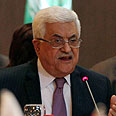
World Bank: Palestinian crisis to deepen without more aid
PA economy faces stressful time unless foreign support grows, Israel eases trade restrictions; Palestinian 2012 budget deficit projected to reach $1.1 billion
The aid-dependent Palestinian economy faces a deepening crisis unless foreign support grows and Israel eases restrictions on its trade, the World Bank said on Thursday.
The Western-backed Palestinian Authority is relying on foreign aid to cover a 2012 budget deficit projected to reach $1.1 billion, but most donor countries have not fulfilled their pledges.
Related stories:
- Is Palestinian uprising in cards?
- Jordan FM hears Palestinian 'no' to renewed talks
- Op-ed: Beware Palestinian despair
The World Bank said in a report released ahead of a meeting on Palestinian aid in Brussels next week that the Palestinian Authority has received just over half of the funds it needs.
Mariam Sherman, the World Bank's director for the West Bank and Gaza Strip, called on donor countries to meet their pledges to help stabilize the Palestinian economy in the short term.
The report said a slowdown in growth in the Israeli-occupied West Bank, where the Palestinians have limited self-autonomy, "can be attributed to falling donor support combined with the uncertainty caused by the Palestinian Authority's fiscal crisis, as well as lack of significant new easing of Israeli restrictions".
Fill the gap
To help fill the gap, Prime Minister Salam Fayyad last month approved a hike in income tax rates to increase revenues, but the World Bank said the economy was still likely to worsen in 2012.
Fayyad, appointed by Palestinian President Mahmoud Abbas in 2007, is credited with revitalizing the West Bank economy. But the World Bank forecast GDP growth in the territory would drop to 5% in 2012 from 5.8% last year.
Per capita GDP in the Palestinian territories, with a combined population of just over 4 million, is $1,500 a year.
"There is a lot of energy and resourcefulness in the Palestinian private sector which is the longer-term path out of crisis mode towards sustainable economic growth," Sherman said.
The report pointed to growth potential in private sector areas including construction, agriculture, housing and tourism.
Instead, economic expansion in recent years has been driven mainly by donor aid, the report said, "which remains stifled by Israeli restrictions on access to natural resources and markets".
Much of the aid comes from the United States, the European Union and Arab nations, and allows the Palestinian Authorities to pay the salaries of public workers.
Adding to its problems, the United States, which is trying to restart Israeli-Palestinian peace talks, cut off funding last year when Abbas defied calls from US President Barack Obama and made a unilateral bid for statehood recognition at the United Nations.
Palestinian officials say more than $150 million of US aid is frozen.
But the growth in Gaza may not be sustainable, the World Bank said. The Gazan economy is still rebounding from a very low base, with the average Gazan remaining "worse off than s/he was in the late nineties," the report said.
- Receive Ynetnews updates directly to your desktop










